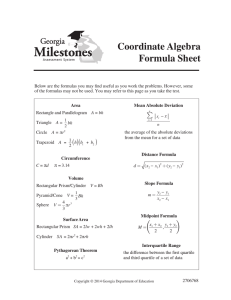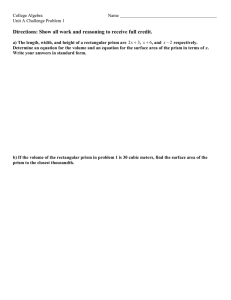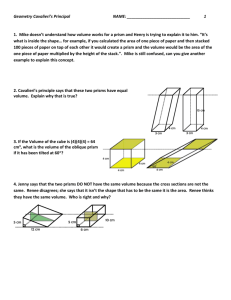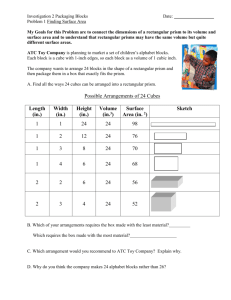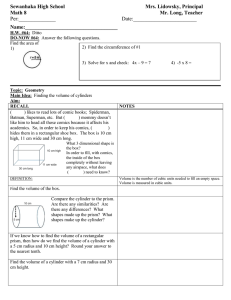Assignment
advertisement
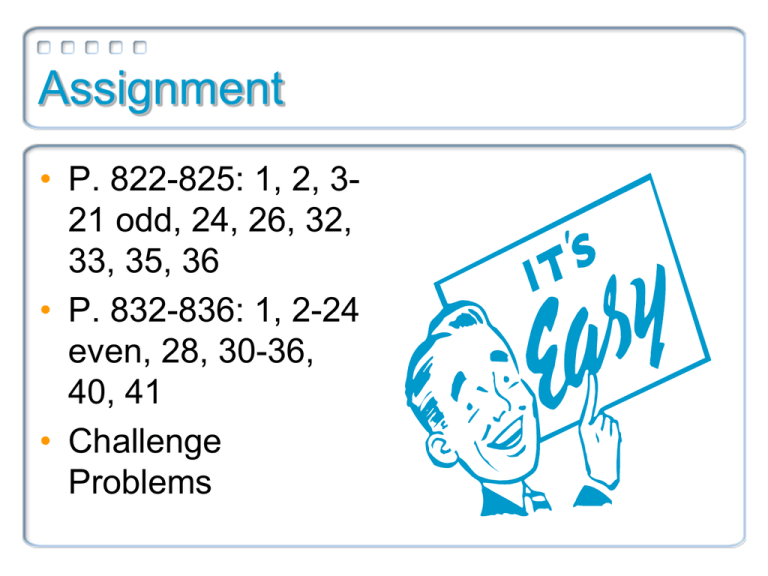
Assignment • P. 822-825: 1, 2, 321 odd, 24, 26, 32, 33, 35, 36 • P. 832-836: 1, 2-24 even, 28, 30-36, 40, 41 • Challenge Problems Units, Units2, and Units3 Recall that length is measured in units: 1 1 Length: 1 unit 1 And area is measured in square units: Area: 1 square unit Units, Units2, and Units3 The volume of something (a polyhedron, a room, a bottle) is measured in cubic units: in3, ft3, cm3, m3, etc. It’s a threedimensional measurement. 1 1 1 Volume: 1 cubic unit Volume Volume is the measure of the amount of space contained in a solid, measured in cubic units. – This is simply the number of unit cubes that can be arranged to completely fill the space within a figure. Exercise 1 Find the volume of the given figure in cubic units. 12.4-12.5: Volume of Prisms, Cylinders, Pyramids, and Cones Objectives: 1. To derive and use the formulas for the volume of prisms, cylinders, pyramids, and cones Volume Postulates Volume of a Cube – The volume of a cube is V = s3. Volume Congruence – If two polyhedra are congruent, then their volumes are equal. Volume Addition – The volume of a solid is the sum of the volumes of all of its nonoverlapping parts. Investigation 1 In this Investigation, you will begin by examining the volumes of simple rectangular solids. You will then generalize your observations to apply to other kinds of solids. Investigation 1 Step 1: Find the volume of each right rectangular prism. (How many cubes measuring 1 cm on an edge will fit into each solid?) Investigation 1 Step 2: To get the volume of the prism, you could use a principle of multiplication to find the number of cubes: Area of the base, B Number of cubes in the base = (2)(4) = 8 cubes Height of prism, h Since the prism is 3 layers high, V = (8)(3) = 24 cubes Exercise 2 Use the formula for the volume of a prism to help derive a formula for the volume of a cylinder with radius r and a height h. Volume of Prisms and Cylinders Volume of a Right Prism Volume of a Right Cylinder V r h V Bh • • B = area of the base h = height of prism 2 • • r = radius of cylinder h = height of cylinder Exercise 3 Find the volume of the regular hexagonal prism shown. Exercise 4 The rectangle shown can be rotated around the yaxis or the x-axis to make two different solids of revolution. Which solid would have the greater volume? Exercise 5 Find the volume of the solid of revolution formed by revolving the rectangle shown around the y-axis. Sections When a solid is cut by a plane, the resulting plane figure is called a section. A section that is parallel to the base is a crosssection. Exercise 6 Exercise 6 Cavalieri’s Principle Suppose you wanted to find the volume of an oblique rectangular prism with a base 8.5 inches by 11 inches and a height of 6 inches… Cavalieri’s Principle The shape of the oblique rectangular prism can be approximated by a slanted stack of three reams of 8.5” x 11” paper… Cavalieri’s Principle The shape can be even better approximated by the individual pieces of paper in a slanted stack… Cavalieri’s Principle Rearranging the paper formed into an oblique rectangular solid back into a right rectangular prism changes the shape, but does it change the volume? Cavalieri’s Principle Similarly, you could use a stack of coins to show that an oblique cylinder has the same volume as a right cylinder with the same base and height. Cavalieri’s Principle If two solids have the same height and the same cross-sectional area at every level, then they have the same volume. All 3 of these shapes have the same volume. Exercise 7 Name the solid shown, and then find its volume. Exercise 8 Given the dimensions shown in the diagram, how much concrete would be used to make 20 cinderblocks? Exercise 9 The volume of the cylinder is 3148 yd3. Find the length of the radius. Investigation 2 In this Investigation you will discover the relationship between the volumes of prisms and pyramids with congruent bases and the same height and between cylinders and cones with congruent bases and the same height. Investigation 2 Step 1: Choose a prism and a pyramid that have congruent bases and the same height. Step 2: Fill the pyramid, then pour the contents into the prism. About what fraction of the prism is filled by the volume of the volume of one pyramid? Step 3: Check your answer by repeating Step 2 until the prism is filled. Investigation 2 Step 4: Choose a cone and a cylinder that have congruent bases and the same height and repeat Steps 2 and 3. Step 5: Did you get similar results with both your pyramid-prism pair and the cone-cylinder pair? Volume of Pyramids and Cones Volume of a Pyramid Volume of a Cone 1 V Bh 3 • • B = area of the base h = height of pyramid 1 2 V r h 3 • • r = radius of cone h = height of cone Exercise 10 Find the volume of the solid of revolution formed by rotating the triangle around the y-axis. Exercise 11 Find the volume of the solid of revolution formed by rotating the triangle around the y-axis. Exercise 12 You are using the funnel shown to measure the coarseness of a substance. It takes 2.8 seconds for the substance to empty out of the funnel. Find the flow rate of the substance in mL per second (1 mL = 1 cm3). Exercise 13 Find the volume of the composite figure. Assignment • P. 822-825: 1, 2, 321 odd, 24, 26, 32, 33, 35, 36 • P. 832-836: 1, 2-24 even, 28, 30-36, 40, 41 • Challenge Problems
